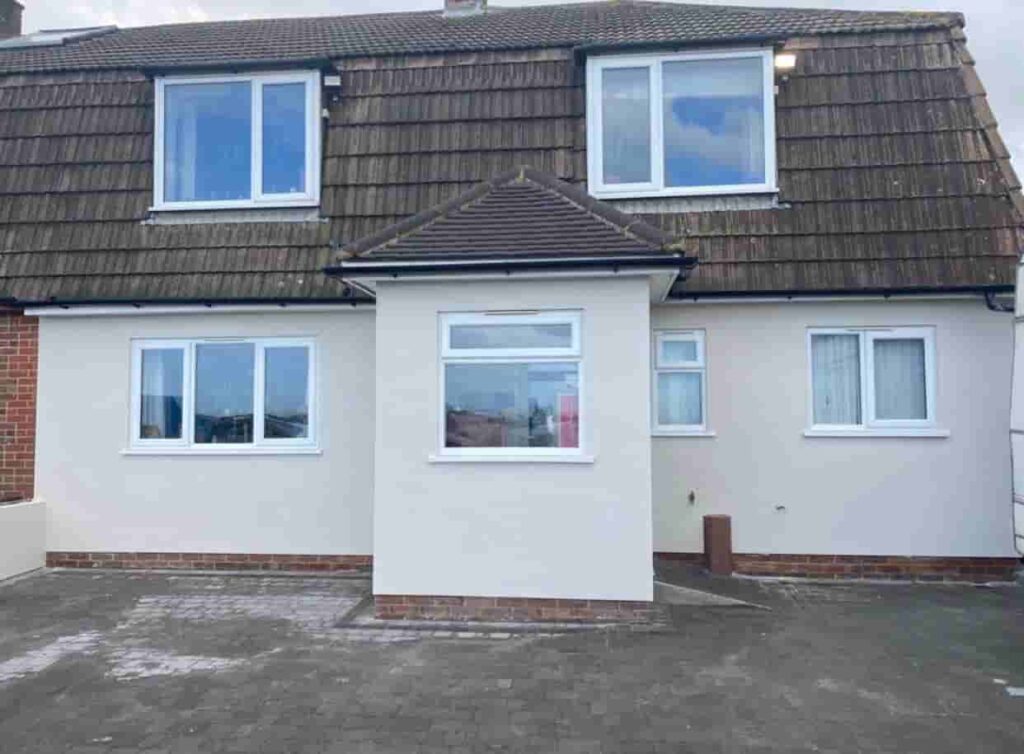Why Flat Roofs Are Popular in Urban and Commercial Buildings
Flat roofs have become a preferred choice for urban and commercial buildings across the UK, offering practical and aesthetic benefits suited to the demands of these environments. Their streamlined design, cost-efficiency, and versatility make them particularly popular in cities, where space and functionality are essential. At EA Roofing Daventry, we specialise in installing and maintaining flat roofs for businesses and properties throughout Daventry, Northamptonshire. In this article, we’ll explore the key reasons why flat roofs are so commonly used in urban and commercial settings, highlighting the advantages they bring to both business owners and building managers.
1. Cost-Effective Installation and Maintenance
One of the primary reasons for the popularity of flat roofs in commercial and urban settings is their cost-effectiveness. Compared to pitched roofs, flat roofs are often more affordable to install and maintain, making them an attractive choice for large buildings and complex projects.
- Lower Installation Costs: Flat roofs require fewer materials and are generally quicker to install than pitched roofs. The straightforward design reduces labour costs, saving building owners money while providing a durable, long-lasting solution.
- Easier Access for Maintenance: With a flat surface, access to rooftop components, such as HVAC units, satellite dishes, and drainage systems, is simplified. This ease of access allows for faster, more efficient maintenance, reducing downtime and disruption for businesses operating in the building.
Flat roofs offer a financially savvy option for commercial buildings, where installation and maintenance costs can have a significant impact on budgets and operational efficiency.
2. Efficient Use of Space
In densely populated urban areas, maximising every inch of space is essential. Flat roofs provide additional usable space that can serve various practical and aesthetic functions.
- Rooftop Gardens and Terraces: Many commercial properties take advantage of their flat roofs by transforming them into rooftop gardens, terraces, or recreational areas. These spaces not only enhance the building’s appeal but can also provide employees with a relaxing outdoor area or even increase rental value for property owners.
- Additional Equipment Storage: Flat roofs are ideal for storing essential equipment like air conditioning units, solar panels, and water tanks without affecting the building’s interior space. This practicality is especially valuable for urban buildings, where indoor space is often at a premium.
Flat roofs enable business owners and property managers to create multi-functional spaces that enhance both the functionality and appeal of their buildings.
3. Modern, Sleek Aesthetic
Flat roofs contribute to a modern, clean-lined aesthetic that is highly desirable in urban environments. This minimalistic appearance aligns well with contemporary architecture, making flat roofs a popular choice for new builds and commercial properties.
- Blending with Urban Architecture: Flat roofs are often associated with modern design, helping buildings fit seamlessly into cityscapes. Their simple, geometric look complements other urban structures, creating a cohesive and stylish appearance.
- Flexible Design Options: Flat roofs also offer flexibility in terms of building height and design, allowing architects and builders to experiment with creative layouts that suit the business’s brand and function.
In addition to their practicality, flat roofs offer an aesthetic appeal that enhances the building’s image and strengthens its presence within an urban setting.
4. Energy Efficiency
Energy efficiency is a significant consideration for commercial buildings, both to reduce costs and to meet sustainability goals. Flat roofs can be highly energy efficient, particularly when designed with modern insulation materials and technologies.
- Insulation Opportunities: Flat roofs provide a straightforward surface for installing insulation layers, helping to regulate indoor temperatures. This insulation can lower heating and cooling costs, an essential benefit for commercial properties that need to manage energy expenses.
- Solar Panel Compatibility: Flat roofs are well-suited for solar panel installations due to their level surface. Solar panels can be installed at the ideal angle for sun exposure, making it easier for buildings to adopt renewable energy solutions and reduce their environmental footprint.
For businesses and property managers looking to improve energy efficiency and reduce operational costs, flat roofs offer significant environmental and economic advantages.
5. Enhanced Drainage Systems
Flat roofs are designed with a slight slope or drainage systems to prevent water accumulation, reducing the risk of leaks and water damage. Modern flat roof designs incorporate efficient drainage solutions that direct water away from the building, maintaining its integrity.
- Customisable Drainage Solutions: Flat roofs can be equipped with built-in drainage systems, such as internal drains, scuppers, and downspouts, tailored to the specific needs of the building and the local climate.
- Reduced Water Accumulation Risks: By directing water efficiently, flat roofs protect the building’s structure and prevent moisture-related issues, such as leaks and mould growth. This feature is particularly beneficial in the UK, where regular rainfall can be a concern.
Efficient drainage solutions enhance the durability of flat roofs, making them a reliable choice for urban and commercial properties that prioritise structural integrity.
6. Adaptability for Future Modifications
Flat roofs provide flexibility for future modifications, making them ideal for businesses that may need to expand or adapt their space over time. Whether the building owner wants to add new rooftop features or upgrade existing systems, a flat roof allows for easy changes without significant structural alterations.
- Room for Additional Installations: As business needs evolve, flat roofs can accommodate additional equipment or features, such as solar panels, green roofs, or satellite dishes. This adaptability allows commercial property owners to keep pace with changing technology and business demands.
- Long-Term Investment: The ability to modify a flat roof makes it a sound investment for businesses looking to future-proof their properties. A well-maintained flat roof can support a variety of changes, allowing business owners to make improvements without the need for costly reconstructions.
Flat roofs offer an adaptable solution that can meet the demands of both today and tomorrow, providing flexibility for business growth and technological advancements.
Conclusion
Flat roofs provide a range of benefits that make them a popular choice for urban and commercial buildings. From cost-effectiveness and efficient space use to energy efficiency and aesthetic appeal, flat roofs offer practical and financial advantages that suit the needs of modern businesses. At EA Roofing Daventry, we specialise in professional flat roofing solutions throughout Daventry, Northamptonshire, designed to enhance the functionality and appearance of commercial properties.
If you’re considering a flat roof for your commercial building, contact us today. Our experienced team can guide you through the best options for your property, ensuring a durable and visually appealing roofing solution that meets your business’s unique requirements. Let us help you make a lasting investment in your property with a flat roof built to perform and impress.
Call us on: 01327 223 899
Click here to find out more about EA Roofing Daventry
Click here to complete our contact form and see how we can help with your roofing needs.

